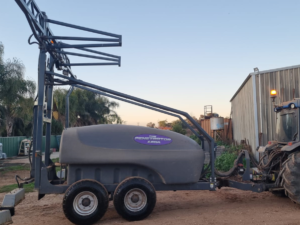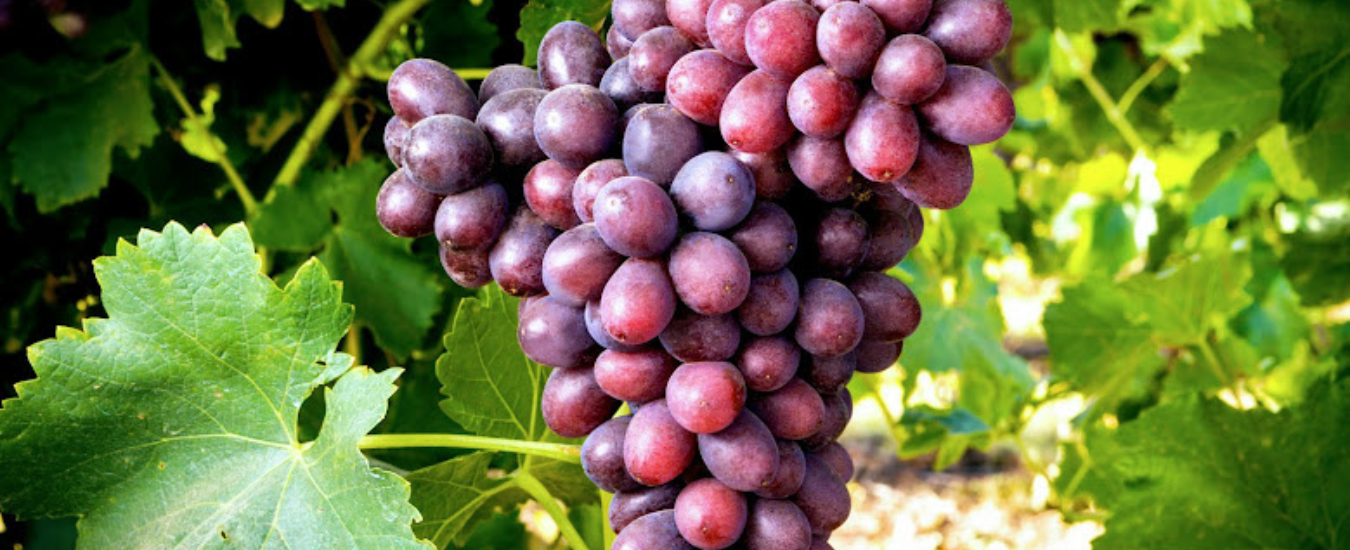Mildura regional table grape growers, the Cirillos, took up the opportunities offered by the Victorian Government’s Agriculture Energy Investment Plan (AEIP) and made gains in energy, labour and water use. Growing table grapes at Irymple, the Cirillos’ Tiger Trust business operates a successful national and global table grape production, marketing and export operation. Vince Cirillo had a free AEIP on-farm energy assessment in 2020 and with AEIP grant assistance implemented a number of energy efficiency initiatives, including the installation of cool room panel insulation, soil moisture probes and a triple row sprayer.
The opportunity
The energy assessment highlighted a number of opportunities for improving energy efficiency in the Cirillo operation – for electricity and diesel. The energy assessment showed that the three irrigation pumping stations accounted for around half of the electricity usage, with the cool rooms accounting for one third. Grapes from the Cirillos’ property are picked during the hot summer and early autumn months, then packed and stored in cool rooms on the property. These refrigerated facilities use considerable power during harvest and post-harvest, when fruit must be kept cool to maintain quality. Solar Photovoltaic panels had prevously been installed at this facility and the Cirillos were looking for other ways to help mitigate energy use. There were opportunities around irrigation that could deliver electricity savings and more. “We always look to apply best practice irrigation management, for delivering quality grapes and minimising our water use.” – Vince Cirillo Soil moisture sensors (or probes) provide information to assist in making optimal (and precision) irrigation decisions. Soil moisture monitoring also has the benefit of reducing water use and energy (for pumping), when previously over-watering could occur. Reducing water stress on the vines in drier periods improves the yield and quality of grapes. The Cirillos had previously installed a number of probes across their vineyard and had five probes operating at the block irrigated by the Home Pump Station. The Cirillos were looking to install a further 8 probes in different varieties of grapes at this block. The energy assessment noted that installation of these additional probes would further reduce energy and water usage as a result of improved water profile insight for the different grape varieties. Spraying operations were the major use of diesel on-farm and a significant component of total energy costs. “We were using a single row sprayer, which meant long operator hours and diesel consumption for spraying – as the tractor had to be driven up and down each single row at a time. We saw access to a more efficient sprayer as a key opportunity for diesel and labour savings.”

Photo: The triple row sprayer sprays three rows reducing the tractor hours (and associated diesel and labour) required – compared to a single row sprayer.
The technology
The Cirillos purchased a triple row sprayer, eight soil moisture probes and cool room insulation panelling. A (tow behind) triple row sprayer can spray three rows simultaneously, significantly reducing the tractor hours (and associated diesel and labour) required – compared to a single row sprayer. The probes detect soil moisture levels at different depths below the surface and provide real-time data to an integrated dashboard (viewed on a mobile device or computer). The dashboard has a number of tools for informing decisions on irrigation and crop management. Cool room panel insulation assists temperature control for storage of fresh produce. The panels are made of a durable, lightweight and energy efficient material – and are designed to retain cooling while protecting from heat gain. Having a better insulated cool room reduces the electricity use for keeping produce cool.
The outcome
Diesel use for spraying used to be about two-thirds of the total diesel use on farm – now its closer to a quarter. “Fuel and labour are key costs for us. As well as very good diesel savings from the new sprayer, there are big time savings.” With eight spraying operations a year needed across the 117 hectares, use of the old single row sprayer would have meant around 600 hours of spraying time a year. For the last year, use of the triple row sprayer has meant spraying hours were reduced to around 200 hours. The new sprayer delivers labour and diesel savings and lower maintenance costs (for the tractor towing the sprayer). It also reduces net soil compaction across the farm as the tractor no longer travels down every row during each spray
The application of crop protection products (fungicides and pesticides) is critical for grape yield and quality. If a protective fungicide is sprayed too late the disease infects the grapes and the damage is irreversible. Missing the ‘window’ to spray for an insect (at a particular stage of development) also means there is no ‘coming back later’ to get that generation of insects. The ability to spray quickly (at the ideal time and conditions) is crucial for achieving optimal crop protection. “Increased efficiency in spraying gives us greater flexibility and better outcomes– we are now much better placed to take advantage of the ‘window’ when there are the best weather conditions for spraying.” Soil moisture monitoring reduces both energy and water use by eliminating over watering. The soil moisture probes (and integrated dashboard) deliver information directly to Vince’s phone, enabling him to more precisely irrigate when and where it is needed. On the block where the eight probes were installed, there has been around a five per cent reduction in electricity use for pumping, and a reduction in water use of a similar magnitude. The cool room panel insulation provides around a 15 per cent reduction in electricity consumption at the cool room. Cool room panels have a long asset life and typically have a relatively long payback period (based on electricity use only). The cool room is an integral part of the Cirillo’s operation and controlling storage temperature for fresh grapes is crucial. Better control of cool room temperatures improves product quality – which can support price premiums for the grapes.
Table 1: Investment costs and benefits of new energy saving technologies
| Technology | Investment cost | Benefits | Modelled annual benefits | Payback (discounted) |
|---|---|---|---|---|
| Triple row Sprayer | $45,000 | Diesel & other | $24,500 | 2 years |
| Soil moisture probes | $16,000 | Electricity & other | $3,100 | 6 years |
| Cool room panels | $42,000 | Electricity | $3,500 | 21.7 years |
The last word
Vince said the project has greatly improved the energy efficiency and productivity of the business – including savings on energy, labour and water use. “This obviously equates to more productivity per dollar – and less emissions, especially in regards to diesel use.” “We’re always looking for sustainable ways to improve grape yield and quality – while reducing our inputs. Making use of our soil moisture probes is integral to this. Getting a modern multi row sprayer that matches our operational needs and labour availability is also key. The triple row sprayer really works for us because it suits the large area of our vines. It has been such a great success, that we have now bought a second one.”
Download a copy of this case study – Gains for grape growers.pdf



